Richard H. Schlagel




To Jane
CONTENTS
PART ONE: THE NONRELIGIOUS FOUNDATION OF MORALITY
Chapter 1:
Chapter 2:
Chapter 3:
Chapter 4:
Chapter 5:
PART TWO: THE CHRISTIAN FOUNDATION OF MORALITY
Chapter 6:
Chapter 7:
Chapter 8:
Chapter 9:
Chapter 10:
PART THREE: THE MEANING OF LIFE WITHOUT GOD
Chapter 11:
Chapter 12:
Chapter 13:
Chapter 14:
PART FOUR: CHRISTIANITY AND THE MEANING OF LIFE
Chapter 15:
Chapter 16:
Chapter 17:
Chapter 18:
PRE FACE
 gratefully acknowledge the help of three people in bringing this volume to completion. I am indebted first and foremost to Paul Kurtz, who invited me to give the Prometheus Lecture which is based on several themes from part 4 of this volume and who has been not just encouraging but inspirational throughout; second, to Steven L. Mitchell, the editor in chief of Prometheus Books, who was a paragon of patience while waiting for me to complete the manuscript and then skillfully guided it through the publication process; and finally to my wife, Jane Roland Martin, who, as well as being a constant source of support, read the manuscript several times and made invaluable editorial and philosophical suggestions.
gratefully acknowledge the help of three people in bringing this volume to completion. I am indebted first and foremost to Paul Kurtz, who invited me to give the Prometheus Lecture which is based on several themes from part 4 of this volume and who has been not just encouraging but inspirational throughout; second, to Steven L. Mitchell, the editor in chief of Prometheus Books, who was a paragon of patience while waiting for me to complete the manuscript and then skillfully guided it through the publication process; and finally to my wife, Jane Roland Martin, who, as well as being a constant source of support, read the manuscript several times and made invaluable editorial and philosophical suggestions.
I wish to thank the editors and publishers of the books, journals, and Web sites from which previously published materials have been taken for granting their permission to reemploy those materials in the present volume. Parts of previously published works of mine have been incorporated into the following chapters: chapters 7, 9, 16, and 17 include material from chapters 6 and 7, and appendices 1 and 2 from The Case against Christianity (Temple University Press, 1991); and chapters 2 and 13 include material from the introduction to Atheism: Philosophical Justification (Temple University Press, 1990). This material is reprinted by per mission of Temple University, who holds the copyright and who reserves all rights. Chapter 18 includes material from from my exchange with Steven Davis that was published in Philo ("Why the Resurrection Is Initially Improbable," Philo 1 [spring-summer 1998]; "Reply to Davis," Philo 2 [spring-summer 1999]; "Christianity and the Rationality of the Resurrection," Philo 3 [spring-summer 2000]. In chapters 2 and 8 I use material from my exchange with Paul Copan ("Atheism, Christian Theism, and Rape," http://www.infidels.org/library/modem/michael- martin/rape.html; "A Response to Paul Copan's Critique of Atheistic Morality," Philosophia Christi 2 [2000]; and "The Naturalistic Fallacy and Other Mistaken Arguments of Paul Copan," http://www.infidels.org/ library/modern/michael_martin/nat_fallacy.html). Chapter 15 borrows material from "Problems with Heaven," http://www.infidels.org/library/ modem/michael-martin/heaven.html.

INTRODUCTION
 he idea that objective morality and the meaningfulness of life are impossible without belief in God has a long history in Western religious thought and is still used by Christian apologists to argue against atheism. Indeed, many religious believers and even some atheists hold the view that atheism has two implications. First, it is alleged that atheism leads to the nonobjectivity of morality; in consequence, it is held that atheists must embrace some form of moral relativism or skepticism or nihilism. Second, it is claimed that if atheism is true, then life is meaningless. Moreover, according to this view, only belief in God can provide the basis for objective ethics and a meaningful life.
he idea that objective morality and the meaningfulness of life are impossible without belief in God has a long history in Western religious thought and is still used by Christian apologists to argue against atheism. Indeed, many religious believers and even some atheists hold the view that atheism has two implications. First, it is alleged that atheism leads to the nonobjectivity of morality; in consequence, it is held that atheists must embrace some form of moral relativism or skepticism or nihilism. Second, it is claimed that if atheism is true, then life is meaningless. Moreover, according to this view, only belief in God can provide the basis for objective ethics and a meaningful life.
These are serious charges. Indeed, theists argue that these implications are grounds for rejecting atheism while atheists try to defend the truth of atheism in spite of them. In particular, the critics hold that if atheism is committed to moral subjectivism, there is no nonarbitrary reason for a person to refrain from rape, murder, theft, and torture. In fact, they go so far as to say that atheists probably engage in actions such as rape, murder, theft, and torture more frequently than religious believers do since there are no nonprudential reasons to prevent them performing atrocities. On the other hand, religious believers in our culture allege that belief in God provides a justification for an objective, nonarbitrary reason for not engaging in murder, rape, theft, and torture. In addition, critics claim that if atheism is committed to the meaninglessness of life, then there is no point in living; and that being aware of this meaninglessness should result in a bleak, depressing, and pessimistic outlook. On the other hand, they say that belief in God gives a point to living and provides for an optimistic outlook.
This book will challenge the view that atheism leads to a nonobjective ethics and the meaninglessness of life. In it I will not only show that objective ethics and a meaningful life are possible without God, I will show that from the dominant religious point of view of our culture there are serious obstacles to developing an objective ethics and having a meaningful life.

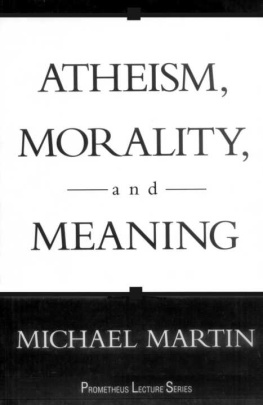
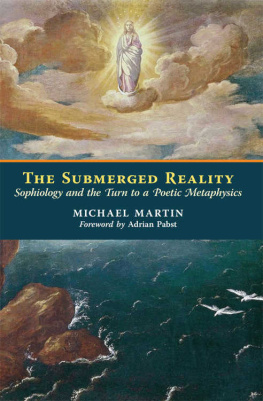



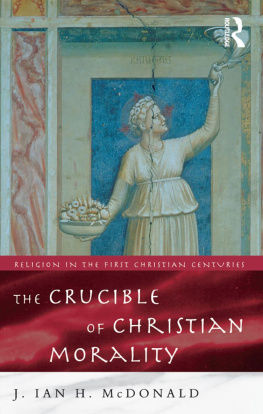
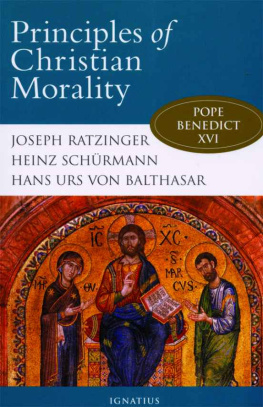
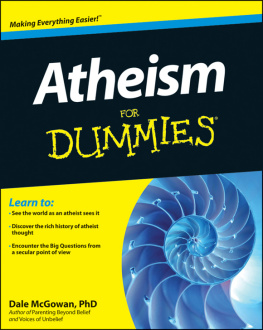
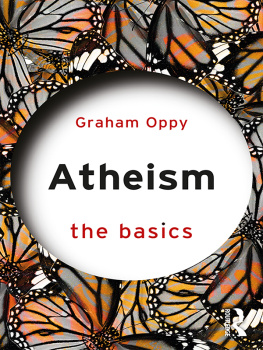
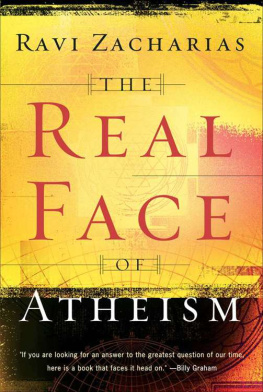
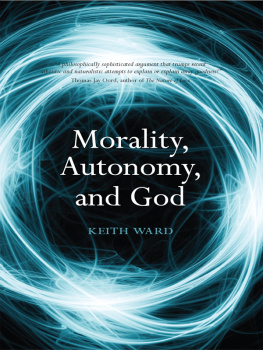
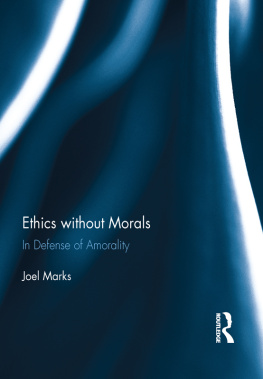












 gratefully acknowledge the help of three people in bringing this volume to completion. I am indebted first and foremost to Paul Kurtz, who invited me to give the Prometheus Lecture which is based on several themes from part 4 of this volume and who has been not just encouraging but inspirational throughout; second, to Steven L. Mitchell, the editor in chief of Prometheus Books, who was a paragon of patience while waiting for me to complete the manuscript and then skillfully guided it through the publication process; and finally to my wife, Jane Roland Martin, who, as well as being a constant source of support, read the manuscript several times and made invaluable editorial and philosophical suggestions.
gratefully acknowledge the help of three people in bringing this volume to completion. I am indebted first and foremost to Paul Kurtz, who invited me to give the Prometheus Lecture which is based on several themes from part 4 of this volume and who has been not just encouraging but inspirational throughout; second, to Steven L. Mitchell, the editor in chief of Prometheus Books, who was a paragon of patience while waiting for me to complete the manuscript and then skillfully guided it through the publication process; and finally to my wife, Jane Roland Martin, who, as well as being a constant source of support, read the manuscript several times and made invaluable editorial and philosophical suggestions.

 he idea that objective morality and the meaningfulness of life are impossible without belief in God has a long history in Western religious thought and is still used by Christian apologists to argue against atheism. Indeed, many religious believers and even some atheists hold the view that atheism has two implications. First, it is alleged that atheism leads to the nonobjectivity of morality; in consequence, it is held that atheists must embrace some form of moral relativism or skepticism or nihilism. Second, it is claimed that if atheism is true, then life is meaningless. Moreover, according to this view, only belief in God can provide the basis for objective ethics and a meaningful life.
he idea that objective morality and the meaningfulness of life are impossible without belief in God has a long history in Western religious thought and is still used by Christian apologists to argue against atheism. Indeed, many religious believers and even some atheists hold the view that atheism has two implications. First, it is alleged that atheism leads to the nonobjectivity of morality; in consequence, it is held that atheists must embrace some form of moral relativism or skepticism or nihilism. Second, it is claimed that if atheism is true, then life is meaningless. Moreover, according to this view, only belief in God can provide the basis for objective ethics and a meaningful life.